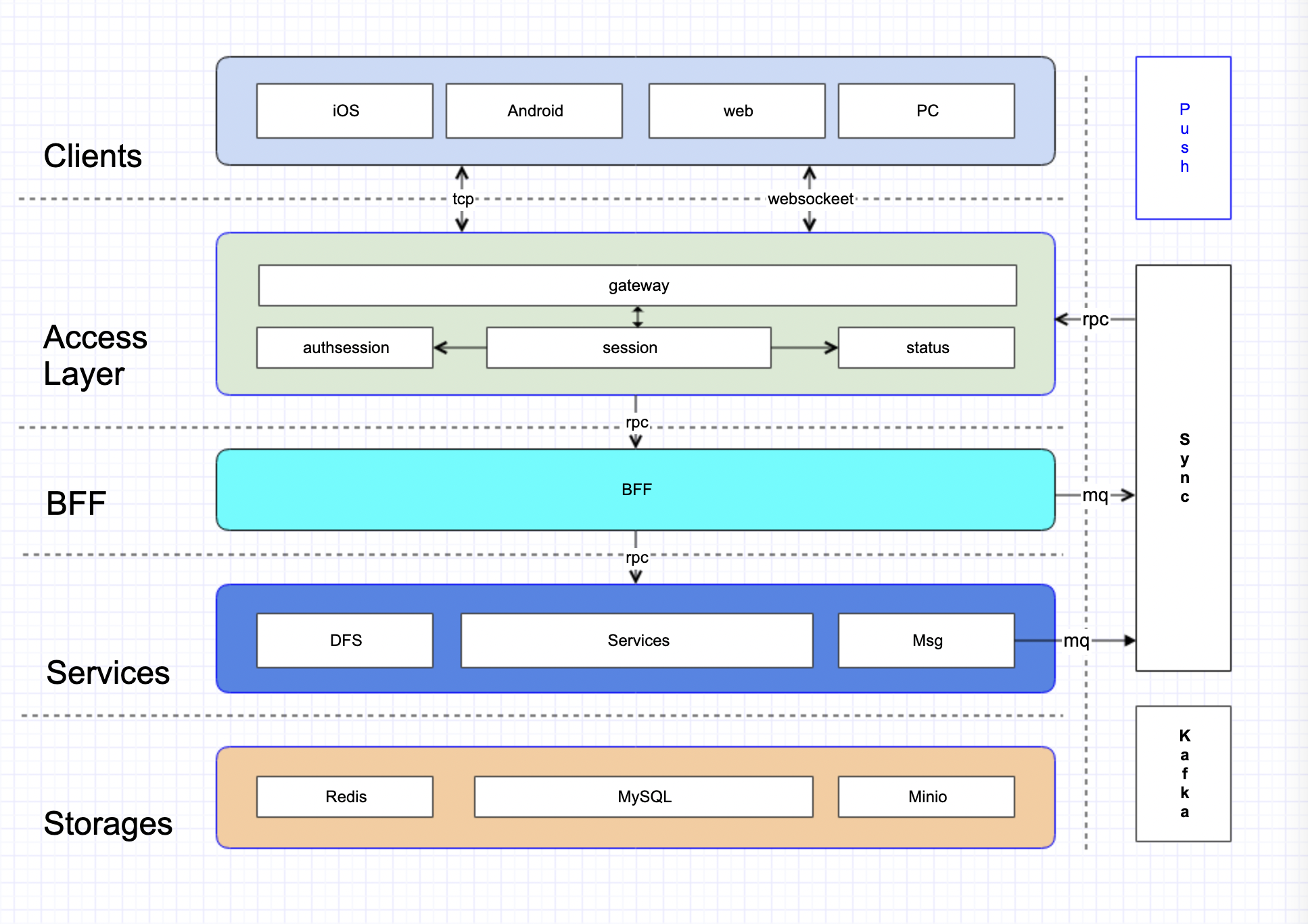Teamgram - Unofficial open source mtproto server written in golang
open source mtproto server implemented in golang with compatible telegram client.
Open source mtproto server implementation written in golang, support private deployment.
- MTProto 2.0
- Abridged
- Intermediate
- Padded intermediate
- Full
- API Layer: 147
- private chat
- basic group
- contacts
Mobile Protocol: Detailed Description (v.1.0, DEPRECATED)
Encrypted CDNs for Speed and Security Translate By @steedfly
Teamgram relies on open source high-performance components:
Privatization deployment Before Teamgram, please make sure that the above five components have been installed. If your server does not have the above components, you must first install Missing components.
- Centos9 Stream Build and Install [@A Feel]
- CentOS7 teamgram-server环境搭建 [@saeipi]
If you have the above components, it is recommended to use them directly. If not, it is recommended to use docker-compose-env.yaml.
Install Go environment. Make sure Go version is at least 1.17.
git clone https://github.com/teamgram/teamgram-server.git
cd teamgram-server
-
init database
1. create database teamgram 2. init teamgram database mysql -uroot teamgram < teamgramd/sql/teamgram2.sql mysql -uroot teamgram < teamgramd/sql/migrate-*.sql mysql -uroot teamgram < teamgramd/sql/init.sql -
init minio buckets
- bucket names
documentsencryptedfilesphotosvideos
- Access
http://ip:xxxxxand create
- bucket names
make
cd teamgramd/bin
./runall2.sh
Install Docker
Install Docker Compose
git clone https://github.com/teamgram/teamgram-server.git
cd teamgram-server
-
change
192.168.1.150to your ip indocker-compose-env.yaml -
install depends
# pull docker images docker-compose -f docker-compose-env.yaml pull # run docker-compose docker-compose -f docker-compose-env.yaml up -d
-
init database
# Copy some files to container docker exec -it mysql /bin/bash mkdir teamgramd docker cp ./teamgramd/sql/ mysql:/teamgramd/sql/ mysql -uteamgram -h127.0.0.1 -pteamgram teamgram < teamgramd/sql/teamgram2.sql mysql -uteamgram -h127.0.0.1 -pteamgram teamgram < teamgramd/sql/migrate-20220321.sql mysql -uteamgram -h127.0.0.1 -pteamgram teamgram < teamgramd/sql/migrate-20220326.sql mysql -uteamgram -h127.0.0.1 -pteamgram teamgram < teamgramd/sql/migrate-20220328.sql mysql -uteamgram -h127.0.0.1 -pteamgram teamgram < teamgramd/sql/migrate-20220401.sql mysql -uteamgram -h127.0.0.1 -pteamgram teamgram < teamgramd/sql/migrate-20220412.sql mysql -uteamgram -h127.0.0.1 -pteamgram teamgram < teamgramd/sql/migrate-20220419.sql mysql -uteamgram -h127.0.0.1 -pteamgram teamgram < teamgramd/sql/migrate-20220423.sql mysql -uteamgram -h127.0.0.1 -pteamgram teamgram < teamgramd/sql/migrate-20220504.sql mysql -uteamgram -h127.0.0.1 -pteamgram teamgram < teamgramd/sql/migrate-20220721.sql mysql -uteamgram -h127.0.0.1 -pteamgram teamgram < teamgramd/sql/migrate-20220826.sql mysql -uteamgram -h127.0.0.1 -pteamgram teamgram < teamgramd/sql/migrate-20220919.sql mysql -uteamgram -h127.0.0.1 -pteamgram teamgram < teamgramd/sql/migrate-20221008.sql mysql -uteamgram -h127.0.0.1 -pteamgram teamgram < teamgramd/sql/migrate-20221011.sql mysql -uteamgram -h127.0.0.1 -pteamgram teamgram < teamgramd/sql/migrate-20221016.sql mysql -uteamgram -h127.0.0.1 -pteamgram teamgram < teamgramd/sql/migrate-20221023.sql mysql -uteamgram -h127.0.0.1 -pteamgram teamgram < teamgramd/sql/migrate-20221101.sql mysql -uteamgram -h127.0.0.1 -pteamgram teamgram < teamgramd/sql/init.sql # quit docker mysql exit -
init minio buckets
-
bucket names:
documentsencryptedfilesphotosvideos
-
create buckets
# get mc docker run -it --entrypoint=/bin/bash minio/mc # change 192.168.1.150 to your ip mc alias set minio http://192.168.1.150:9000 minio miniostorage # create buckets mc mb minio/documents mc mb minio/encryptedfiles mc mb minio/photos mc mb minio/videos # quit docker minio/mc exit
-
# run docker-compose
docker-compose up -d
Important: default signIn verify code is 12345
Please report bugs, concerns, suggestions by issues, or join telegram group Teamgram中文社区 Or Teamgram to discuss problems around source code.
If need enterprise edition:
- sticker/theme/wallpaper/reactions/2fa/secretchat/sms/push(apns/web/fcm)/web...
- channel/megagroup
- audiocall/videocall/groupcall/
rtmp live stream - bots
please PM the author
If you like or are using this project to learn or start your solution, please give it a star. Thanks!
